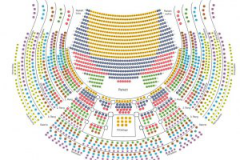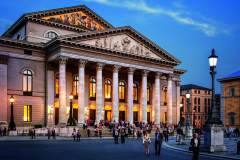Il Trovatore
Mo | Tu | We | Th | Fr | Sa | Su |
Opera in four acts (eight tableaux) (1853)
recommended for 15 years and older
In Italian with German and English surtitles. Premiere 27.6.2013..
Duration est. 2 hours 50 minutes
"If you travel to India and to Central Africa, you'll hear Trovatore.“ Nine years after the triumphant first performance, Verdi's opera had achieved the worldwide popularity that moved the composer to make this comment. The fabric of the opera could hardly be more gloomy: a gypsy who wishes to avenge the death of her mother at the stake, a count who wishes to use the execution of this gypsy to strike at his rival; a horrifying truth that is revealed at the moment of death. All the ingredients of Verdi's dramatic abundance appear here: mysterious sound worlds, harsh contrasts, vocal brilliance, opulent tableaux. The cohesive narrative style gives way to the variation of suggestive musical images with which Verdi served "the most important part of the drama“: revenge.
PLOT
Past History
Count di Luna, meanwhile deceased, had two sons. One day a gypsy was discovered standing beside the cradle of the younger son. When the child subsequently became ill, the woman was condemned to death at the stake for being a witch. The gypsy’s daughter, Azucena, thereupon abducted Luna’s younger son in order to burn him to death in the same place and thus take revenge for her mother’s death. However she mistook her own son for the boy she had abducted. In his place she raised Luna’s younger son as her own child and called him Manrico.
Civil war has broken out in Spain in connection with the crown of Aragon. Luna’s elder son is now the Count di Luna and is fighting on the side of the king. Manrico has joined the rebels.
Part One: The Duel
Ferrando, a captain in Luna’s army, tells the men in his service the story of the burning of the old gypsy and her daughter’s act of revenge. He is convinced that the old woman’s spirit is still haunting the earth.
Leonora is awaiting the arrival of her favourite suitor, the troubadour Manrico. She tells Ines how she met him at a tournament. Count di Luna, who is also in love with Leonora, declares his love. When Manrico’s voice is heard and Leonora hurries to meet him, she finds Luna, whom she has mistaken for Manrico in the darkness. Manrico and Luna realize that they are not only rivals for Leonora’s affection but also political opponents. They challenge each other to a duel.
Part Two: The Gypsy
Manrico has defeated Luna in the duel but was held back from killing him by an inner voice. In the ensuing struggle with Luna’s men he has been wounded. Azucena tells him the story of how her mother was burnt at the stake and her own act of revenge in which she burnt her own child instead of Luna’s son. She reacts with excuses to Manrico’s doubts and questions as to whether he is really her son. A messenger announces that Leonora, believing Manrico to be dead, has decided to enter a nunnery. Manrico decides to prevent this from happening.
Leonora mourns the death of Manrico. Luna has also heard about his beloved’s plans to become a nun and intends to abduct her. Manrico and his men, however, successfully seize Luna’s weapons and flee with Leonora.
Part Three: The Gypsy’s Son
Manrico has taken refuge with Leonora in a castle, which Luna’s soldiers are preparing to storm. Azucena has been taken prisoner, accused of being a spy. Ferrando recognizes her as the gypsy who abducted the count’s brother. When Azucena desperately calls out for Manrico it becomes clear to Luna that he has the mother of his deadly enemy in his power.
Manrico and Leonora are preparing their wedding when Ruiz, a soldier in his service, informs them that Azucena has been taken prisoner. Manrico calls his followers to arms and sets out to free the woman he believes to be his mother.
Part Four: The Execution
Manrico’s attempt to free Azucena has failed. He has also been taken prisoner. When Leonora hears that Luna is planning to have mother and son executed she begs him to set Manrico free and offers herself as the reward for Luna’s mercy. The latter agrees. Leonora secretly takes some poison in order not to have to keep her promise.
Manrico comforts Azucena, who longs to return home. Leonora urges him to flee immediately – she herself will remain, however. Manrico suspects what price she has paid to save him. Leonora dies. Luna realizes he has been deceived. He has Manrico executed immediately and forces Azucena to watch. She discloses the truth to him: „He was your brother!“
Program and cast
Conductor: Andrea Battistoni
Director: Olivier Py
Stage Designer: Pierre-André Weitz
Lighting: Bertrand Killy
Chorus: Christoph Heil
Conte di Luna: Artur Rucinski
Leonora: Rachel Willis-Sørensen
Azucena: Judit Kutasi
Manrico: Piotr Beczała
Ferrando: Alexander Köpeczi
Ines: Elene Gvritishvili
Ruiz: Granit Musliu
Un vecchio zingaro: Daniel Vening
Un messo: Michael Butler
Bayerisches Staatsorchester
Chorus of the Bayerische Staatsoper
Extrachor der Bayerischen Staatsoper
National Theatre Munich
The National Theatre Munich (German: Nationaltheater München) is an opera house in Max-Joseph-Platz in Munich, Germany. It is the home of the Bavarian State Opera and the Bayerisches Staatsballett(Bavarian State Ballet).
The Bavarian State Opera also performs in the Prinzregententheater, which opened in 1901 and, like the Bayreuth Festspielhaus, is built to Richard Wagner's specifications, and in the Cuvilliés Theatre at the Residenz, constructed in 1751–1753 and described by Thierry Beauvert as "a Rococo gem".
The Nationaltheater is very easy to get to both by car and by MVV public transportation.
By MVV public transportation
S-Bahn: S 1 - 8 Marienplatz
U-Bahn: U 3, 6 Marienplatz, U 3 - 6 Odeonsplatz
Bus: 52, 131 Marienplatz, 100 Odeonsplatz
Straßenbahn: 19 Nationaltheater
On the day of the performance, holders of regular tickets are entitled to use public transport provided by the Münchner Verkehrsverbund (MVV). This service starts at 3 pm respectively three hours before the performance commences and ends with the closing hour of the MVV.
By Car
Take the Altstadt-Ring to Maximilianstraße.
Parking garage Max-Joseph-Platz: open Monday to Sunday from 6:00 A.M. to 2:00 A.M.
You can take advantage of the special theatre parking fee of Euro 10,- from 6:00 P.M. to 8:00 A.M. by presenting your admission tickets.

 EN
EN DE
DE IT
IT FR
FR ES
ES RU
RU JP
JP RO
RO
 Seating plan
Seating plan 

